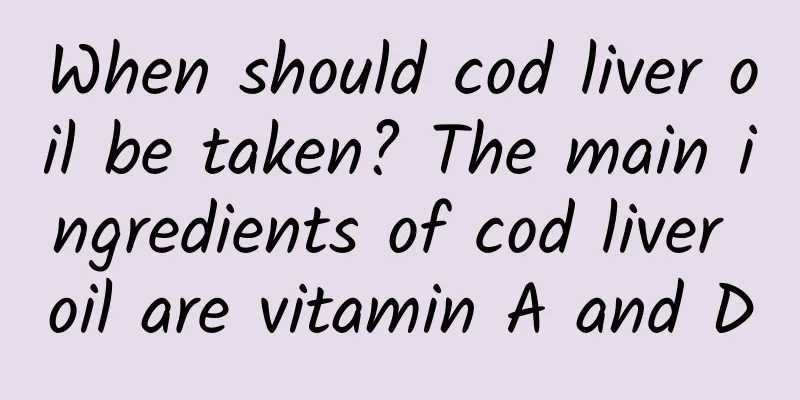When should cod liver oil be taken? The main ingredients of cod liver oil are vitamin A and D

|
Fish liver oil usually contains unsaturated fatty acid glycerides and saturated fatty acid glycerides. In addition, it contains cholesterol, vitamin A and D. It also contains 19-decanol, 21-decanol, isooctadecane, etc. The functions and indications of fish liver oil: It is used for night blindness, keratitis, rickets, vitamin A and D deficiency, malnutrition and the recovery period of diseases. The main components of cod liver oil are vitamins A and D.The main function of vitamin A is to maintain normal growth, reproduction, vision, epithelial tissue and anti-infection immunity. Vitamin A deficiency can cause: skeletal retardation in children; affect the development of tooth enamel cells, resulting in incomplete teeth; damage to epithelial tissue structure; low immune function can easily lead to various infections of the respiratory tract, digestive tract and urinary tract. The main function of vitamin D is to promote the absorption of calcium and phosphorus by the small intestinal mucosa and to promote the reabsorption of calcium and phosphorus by the renal tubules. Vitamin D deficiency can cause: reduced intestinal absorption of calcium and phosphorus, calcification disorders of bone-like tissues; rickets, manifested as easy fright, sweating, irritability and bone changes. Vitamin A and D are both fat-soluble vitamins. Vitamin A is found in animal liver, especially fish liver, followed by milk and eggs. The other is in the form of carotene in food, such as carrots, tomatoes, beans and green leafy vegetables, which is converted into vitamin A in the liver. Vitamin D is mainly found in the liver of animals, especially in the liver of marine fish. In addition, 7-dehydrocholesterol in the skin can also be converted into vitamin D under the action of ultraviolet rays. The human body obtains vitamin D from sunlight and food. It can be seen that cod liver oil is not the only source of vitamin A and D for children. When is it necessary to supplement cod liver oil?1. The following situations require cod liver oil supplementation: If the baby does not have enough breast milk or is not given egg yolks, animal livers and other foods rich in vitamins A and D, as well as vegetables and fruits rich in carotene in time after weaning; or if the baby suffers from chronic diarrhea, liver and gallbladder diseases that affect the absorption of vitamin A and D; or if the baby suffers from chronic wasting diseases that increase the consumption of vitamin A and D; or if there is a lack of sunlight; or if the baby grows too fast and the demand increases, etc., these factors can cause vitamin A and/or D deficiency. The content of vitamin A in breast milk is higher than that in cow's milk. If the mother has adequate nutrition and a balanced diet, the vitamin A in breast milk can mostly meet the needs of the baby. However, vitamin D is less in breast milk and cow's milk. Therefore, whether it is human milk or cow's milk feeding, infants must take a preventive dose of 400 units of vitamin D every day from 2-3 weeks after birth, and continue to take it for 2-3 years. Especially for premature infants, twins and children with the above-mentioned factors causing vitamin A and D deficiency, they need additional vitamin A and D supplements. After the age of 2 or 3, children's growth rate slows down, their diet variety and outdoor activities increase, and generally there is no need for additional cod liver oil supplementation. Is it better to take more cod liver oil supplements?The recommended daily intake of vitamin A and vitamin D is 2500-5000 units and 400-800 units respectively. If a large dose is taken in a short period of time, or if excessive daily intake of vitamin A and D is taken for a long time, it can cause poisoning. Symptoms include decreased appetite, lack of weight gain, irritability, sweating, headache, vomiting, drowsiness, joint pain, muscle pain, etc. The commercially available concentrated vitamin AD drops (concentrated cod liver oil drops) contain 50,000 units of vitamin A and 5,000 units of vitamin D per gram, respectively. 1 gram is about 30 drops, so 3-5 drops per day are enough. We often see some parents who say that they have added various vitamins to their children, but why do their children still have a poor appetite and no weight gain? After carefully asking about the baby's feeding situation, it turns out that they are fed with formula milk and cod liver oil or multivitamin syrup. The result is that although the dose is not toxic, it is an overdose. After stopping the cod liver oil, the appetite is significantly improved. Therefore, when we feed various infant formula milk and fortified foods, we must carefully read the content of vitamin A and D in the formula. We should pay attention to the total daily intake of the baby, including from various vitamin-fortified foods, to avoid excessive dosage and even poisoning. |
<<: What are the benefits of eating durian? The nutritional value, efficacy and function of durian
>>: What are the benefits of eating kelp? The nutritional value, efficacy and function of kelp
Recommend
Black slag picture in early pregnancy
Some women have dark brown blood residue in the e...
The difference between male and female fetuses
Even with modern medical testing technology, doct...
What is the effect of adding white wine to pickled cucumbers? When should white wine be added to pickled cucumbers?
We all know that there are many ways to cook cucu...
When should I drink soy milk to enlarge my breasts?
Having a charming figure is the unremitting pursu...
Abdominal discomfort during ovulation
Women who are in their ovulation period often fee...
What should you pay attention to in your diet during early pregnancy
For some pregnant mothers, they pay special atten...
How to remove beard on women
Generally speaking, women do not have beards, but...
What should I do if vaginal urination hurts?
If women experience pain when urinating or feel d...
Symptoms of ascites after egg retrieval
Women who want to undergo artificial insemination...
Use boiling water or warm water for donkey-hide gelatin powder
For the vast majority of women, there is more or ...
20 kinds of bread red and black list: these 4 kinds are really not recommended
Many friends choose bread for breakfast, but ther...
[Technology benefits the people] Our hospital's ophthalmology department independently carried out the first highly difficult level 4 surgery - vitrectomy, and the patient regained clear vision
Recently, the Department of Ophthalmology of our ...
Best time for women to conceive
As the Chinese say, there are three types of unfi...
28 days of menstrual cycle, when is the ovulation date
For women who are preparing to get pregnant, they...
Can I go hiking when my period comes?
Can ladies go hiking when they are menstruating? ...









